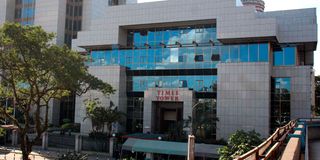President Ruto warns KRA staff over Sh7bn tax fraud

Times Tower in Nairobi, the headquarters of Kenya Revenue Authority. President William Ruto says rogue KRA officials have been selling stamps for excisable products.
President William Ruto has put Kenya Revenue Authority (KRA) staff on notice amid claims that some of them colluded with tax evaders to defraud the State.
In a scathing attack on the taxman yesterday, the President indicated that other than taxpayers’ apathy, corruption within KRA had made it difficult for the government to collect revenues to its full potential.
“Revenue leakages, collusion between evaders and KRA officials to subvert revenue administration, a culture of raids, extortion, disruption of taxpayers’ operations, and obstruction of business are some dimensions of a wrong culture, robbing our citizens of shared prosperity,” the President said, adding that he had discussed the issues with KRA Commissioner-General Githii Mburu.
The President said rogue KRA officials have been selling stamps for excisable products and pocketing about Sh7 billion. He noted that while Tanzania and Uganda's economies are smaller than Kenya, the two countries sell Sh7.2 billion stamps (Tanzania) and Sh9 billion stamps (Uganda), while Kenya sells Sh2.9 billion stamps.
Sh12 billion stamps
“Those two economies are smaller than ours.... it means we should be selling between Sh10 billion and Sh12 billion stamps. The trouble is (when) the government is selling Sh2.9 billion stamps, there are people who are selling the balance, which is approximately Sh7 billion stamps,” President Ruto said.
He said while the government would not go after the officials, whose details have been shared with the Commissioner-General, they must stop.
“I do not want to fight with people, but you must stop. I want to tell the good people in KRA, you must stop. I have given the CG enough info to sort that mess and I have told him if he doesn’t sort it out, I will sort it out myself and we should be able to collect enough money,” he said.
The President also wants the authority to register every citizen with a national ID and provide them with a taxpayer’s PIN, as a first step to bringing more taxpayers on board and expanding the tax base.
Loyal taxpayers
“We must move decisively and efficiently to increase the number of taxpayers of all categories and steadily push the tax base towards its potential. No single taxpayer who is eligible should be left out from this obligation because every exemption denies Kenyans the right to benefit from national resources and it's unfair to the loyal taxpayers who do the right thing,” he said.
The President faulted KRA for failing to tap into technology effectively and instead using forceful and aggressive means to collect revenues scaring away enterprises, as he appeared to imply many eligible taxpayers are still off the hook.
“There are only 7 million people with KRA PINs. At the same time, in the same economy, Safaricom’s M-Pesa has 30 million registered customers transacting billions daily. The fact that this opportunity remains unclear to KRA demonstrates why radical changes are necessary. Every Kenyan with an ID should have a PIN,” he said.
M-Pesa, however, allows people to register multiple accounts depending on the number of sim cards they possess, and thus the 30 million customer accounts may not necessarily translate to 30 million people.
Sh3 trillion in revenues
He said this as he put KRA on task to collect Sh3 trillion in revenues during the next financial year, about Sh1 trillion on top of the authority’s collections in the 2021/22 financial year, the first time it ever collected beyond Sh2 trillion.
“I expect KRA to raise at least Sh3 trillion by the end of the next financial year and to double the current collection in five years,” he said.
The President also continues to insist that his government will tax wealth as a shift from overtaxing trade, to supporting enterprise growth.
During the KRA Taxpayer event yesterday, Safaricom was awarded the top taxpayer of the year, followed by Kenya Breweries Limited, KCB Bank, and Twiga Foods. Other businesses that were awarded included Boston Consulting Group Kenya, Lab international Kenya Ltd, Edible oil products Ltd, Isuzu E. A Ltd, CFAO Motors Kenya Ltd, and Vivo Kenya Ltd.





